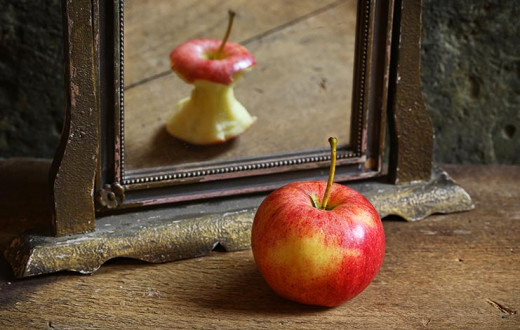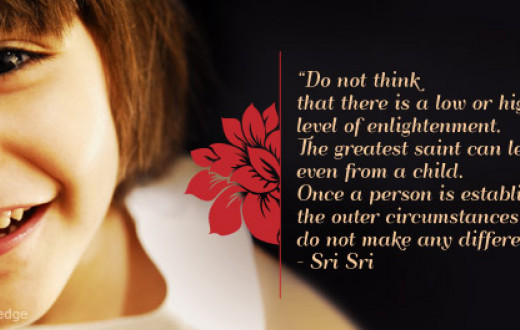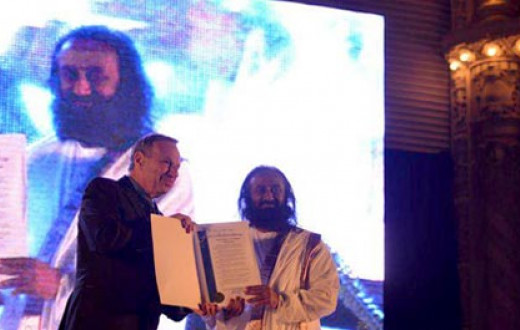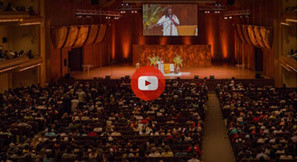
It is not that the truth is different; the difference only lies in the way different people express the truth.
Through different ways of expression, we elevate the consciousness that is lying dormant. We try to rekindle the love that is stuck in negativity. We try to re-awaken the faith that lies asleep within ourselves. Once it is done, we put these means aside. The means of doing this is called Avalamban (literally meaning anything that is used as an instrument to achieve something).
It is any means, through the support of which we fulfil our goal, or what we want to achieve.
Ultimately when you relax and go deep in meditation, that is when you realize that “The divine is in me, and I belong to the divine”.
If there is a narrow vessel which contains Ghee (clarified butter), then we cannot scoop out the Ghee very easily. We have to bend or twist our finger to remove the ghee. Or we have to use a spoon. How long do we use the spoon for? We use it as long as we are scooping out the Ghee from the vessel. In the same way, an idol is also a means to kindle and awaken that deep feeling of love and devotion for the Divine. Similarly, rituals are another way to awaken feelings of devotion. But the divine is not confined to an idol or ritual. The divine is beyond all of these and can be experienced at the level of Tattva (most fundamental element or principle of creation) by going deep into meditation. All rituals, Vidhis, (procedures), Yajnas (sacred fire sacrifices) are a means to elevate our consciousness and soak into the intense feeling of devotion. Ultimately when you relax and go deep in meditation, that is when you realize that “ The divine is in me, and I belong totally to the divine”.
In a few days from now we will be celebrating Gandhi Jayanti (the birth anniversary of Mahatma Gandhi). What can we learn and imbibe from the life of Gandhiji? See, it is useless to just have some celebration or function to commemorate a great person’s birth anniversary. The important thing here is to learn from their lives and understand what one should do and also what one should not do. Now, most of us already know what we need to do.
What were the qualities that Gandhiji followed? One should have right intellect, embrace everyone with love and compassion, having total faith in the divine, and also being completely dedicated to the cause of the Nation and its people, above all things.
Now what are the things we should not do? What did Gandhiji do that we should not do? He troubled his wife Kasturba and his children a lot. That is why his own children became such rebels. Gandhiji was lovingly called Bapu (literally meaning “father”) by everyone around him, but he could not become a loving and ideal father for his own sons. He did not do full justice to the role of a father. It is not that someone else said this about him, he admitted this himself later in his life. He admitted that he was harsh on his own children. You cannot use the same ‘stick’ to punish everyone around you ( meaning using the same yardstick or measure of justice for everyone). You cannot use the same stick to hit a cow, a dog and a child. That is not right. You should have a different yardstick and different style to deal with different people.
My teacher Sudhakar Chaturvediji was a contemporary of Gandhiji and was also very close to him. He is still alive today, and is 118 years old, but he is quite aged. He was with Gandhiji when he was jailed by the British, and when Kasturba was breathing her last. He told her, “Today’s is Bapu’s trial by fire”.
As her end drew nearer, Kasturba had tears in her eyes and requested Sudhakarji to recite the second chapter of the Bhagavad Gita to her in which Lord Krishna speaks of the qualities of a Sthithaprajna (one who is wise and has equanimity in all situations). As he recited the second chapter, Kasturba breathed her last and left her body.
Gandhiji later told Sudhakarji, “I gave her a lot of difficulty. I could not give her much peace and comfort during her life. I robbed her of all her freedom and independence, when I should have listened to her and also kept her happy. This I did not do”.
You should have a different yardstick and different style to deal with different people.
The other thing that always pinched Gandhiji’s heart was that one of his sons got converted to another religion and renounced Hinduism. He felt very hurt at this. He said, “We should put a stop to this religious conversion. I did not educate them well enough about their own faith”. This remained a thorn in his heart for a very long time. He raised his voice against religious conversion.
When the time of India’s partition came, no one could believe that Gandhiji could support such a decision to divide the country. He was not able to believe that there was so much bloodshed and violence happening in Pakistan. So he asked Sudhakarji as an ambassador to check the situation and bring back reports about what was really happening.
Sudhakarji went there to assess the situation. He faced a lot of difficulty. He was fatally attacked seven times during this trip because people did not trust him. He was buried up to his neck in the ground and would have been assaulted. Fortunately the army came there and intervened at the right time, so he was saved. Somehow he escaped from there and returned. He was wounded at seven places on the body. When he returned and told everything to Mahatma Gandhi, he could not believe what he heard. He told Sudhakarji, “You are lying. You are telling me all this only because you are a Hindu. Our Muslim brothers cannot do such wicked acts”.
Sudhakarji felt so angry and dejected at hearing this. He felt so disappointed especially after having spent so many years with Gandhiji together. So he left everything and came back to Bangalore. Three days after this event, Mahatma Gandhi died after being shot at in a public gathering by Nathuram Godse. When Sudhakarji heard this, he grew very sad. It remained a sorrowful memory in his heart. He often thought, “Oh, in a fit of anger I left Gandhiji’s side and in just three days all this happened”. It pained his heart a lot. He often repented as to why he left Gandhiji’s side because of a disagreement.
Gandhiji would not listen to others around him and would follow only what he thought. His approach was not democratic. He used to be more like a dictator in life, and would expect people to follow only what he said. He was very rigid. He would not be flexible. He would rigidly hold on to a thought and not listen to others. He would expect everyone to follow his word and will alone.
At the time of electing the Prime Minister of the country, everyone except one person voted for Sardar Vallabh Bhai Patel. But despite that Mahatma Gandhi chose otherwise and did not go by what the majority wanted. He was not very democratic in his approach A leader who laid the foundation stone for democracy in this country was actually more of a dictator in his personal ways of conduct. Many times he would become stubborn and rigid while making decisions. Sometimes he would take a decision in an emotional manner rather than logically understanding the situation and weighing out the good and the bad, or even consulting others. He would expect everyone else to bend to his will without question.
In the Sabarmati Ashram that he had established, he would ask his cooks to prepare a chutney made of Neem leaves. Now what is the harm in enjoying one’s meals? But he would not allow tasty food to be made because he believed that this would teach people detachment and control over oneself. There is no need to try and test everyone like this. If you like, then you should have it yourself. Why make others also eat the same kind of food? But there is a good side to this as well. By doing this one can stop being a glutton and overly attracted to food. It is good for a Sanyasi but not for someone who is still engaged in the worldly duties. It is especially not good for children.
Click Here to continue reading














































